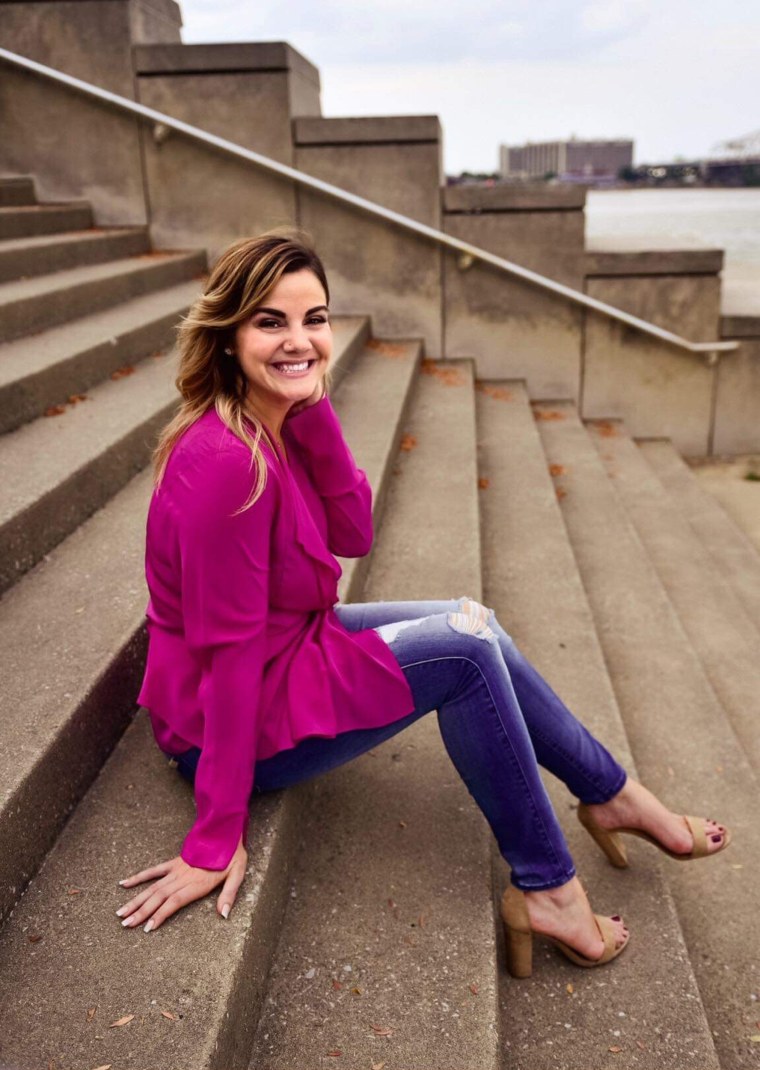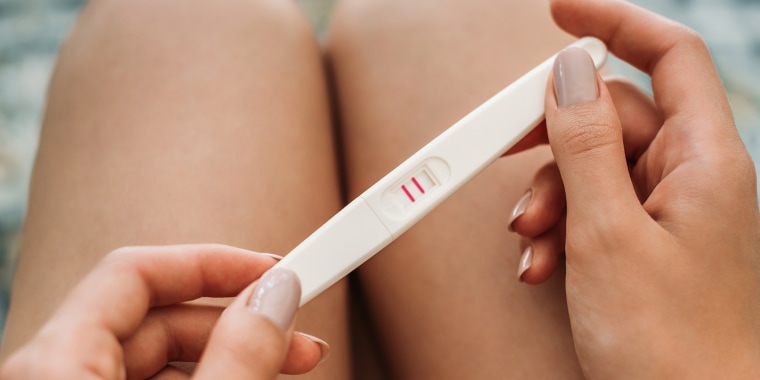As soon as Katie Rollins learned she was pregnant, she posted about it on social media.
“Right when we found out, so at five weeks,” Rollins, 37, of Louisville, Kentucky, told TODAY Parents. “We had been trying for a year, so we got excited and didn’t wait to tell people.”
Shortly after that, Rollins shared a live gender-reveal video announcing that her baby-to-be would be a girl — and shortly after that, she had a miscarriage.
“I wish I didn’t tell the world, because having to tell the world she’s gone now makes it feel a thousand times worse,” she wrote on Facebook last November. “But here we are, this is part of it too. I love and appreciate the support and am not ready to talk about it but thank you for being there.”
More than 300 people commented on Rollins’ post. That outpouring prompted Rollins to share this message a few weeks later:
“The ... incredible thing that came out of having a miscarriage was realizing how many other people were in my corner who went through that minefield before me and shared so that I did not feel alone.”

Rollins is part of a growing number of women who are choosing not to keep their early pregnancy a secret. The thinking used to be that you shouldn’t share the big news before the second trimester, when the risk of miscarriage drops significantly. But now women are breaking the silence around early pregnancy and miscarriage.
Hilaria Baldwin, 35, may be the most high-profile example of this trend. Baldwin, a podcaster, mother of four and wife to actor Alec Baldwin, shared on Instagram about her miscarriage while it was in progress and also spoke about it on the TODAY show.
Baldwin is not the first celebrity to open up about pregnancy loss, although she may be the first to do so in real time.
“I have no shame or embarrassment with this experience,” Baldwin wrote on Instagram. “I want to be a part of the effort to normalize miscarriage and remove the stigma from it. There is so much secrecy during the first trimester. This works for some, but I personally find it to be exhausting. ... I have to pretend that everything is just fine — and it truly isn’t. I don’t want to have to pretend anymore.”
TODAY’s Dylan Dreyer addressed the pressure of silence around early pregnancy when she revealed recently that she had a miscarriage and has been struggling with secondary infertility. She recounted how she found out she was having a miscarriage, and in a few hours had to go live on air for TODAY acting as if nothing was wrong.
“Brian and I have been going through all this without anyone knowing because these are all private things ... aren’t they?” Dreyer wrote in an essay for TODAY Parents. “Why do women (and their partners) have to go through all these ups and downs in the dark? Smiling on TV when I want to burst out in tears, playing it cool on TV when I want to jump up and down in excitement. I have been dealing with so many intense emotions.”
A generation ago, women who experienced a miscarriage were often told to “go home from the doctor’s office or hospital and forget about the baby they had lost,” said Naomi Skop Richter, director of community programs at the Pregnancy Loss Support Program of the National Council of Jewish Women. She said as more millennials become parents, they are speaking and writing more openly about early pregnancy, miscarriage and stillbirth.
“This is no surprise given general trends to post about challenges and feats related to fertility and parenting on social media, but it is slowly helping to lessen the stigma around loss,” Skop Richter said. “One major gain is that more people know how common it is to lose a pregnancy, as opposed to times in the past when some women didn’t know this was a possibility since no one talked about it.”
This trend toward openness is not just another case of social media oversharing — it’s a move that has important consequences. Not acknowledging a loss or feeling forced to keep it secret can be dangerous to a person’s mental health, Skop Richter explained.
“Today, we know that neglecting to process a pregnancy loss at any stage can have serious negative outcomes including an increased risk of depression,” Skop Richter said. “We’re also seeing losses more holistically within the family system — acknowledging that fathers, children, aunts, uncles and grandparents all experience the loss.”
When Carrie Chew, a 40-year-old attorney in Washington, D.C., first got pregnant, she told friends and coworkers and waited to go “social media public” until her second trimester. But the second trimester never came.
The next time she got pregnant, she didn’t wait to tell people — and it was in no small part due to her prior experience.
“My thinking at the time was something along the lines of: ‘The first loss was so isolating, why would I want to risk having to go through another alone?’” Chew recounted. This pregnancy also ended — this time with a medically necessitated termination.
“I felt very energized — aggressive, really — about making pregnancy at every stage ‘visible,’” Chew said. “Making loss visible, too, since it’s part and parcel of the whole path to childbearing.”
Total openness isn’t for everyone, of course; women and their partners need to do what feels right for them. So McCutcheon, a 39-year-old attorney in Short Hills, New Jersey, went through three pregnancy losses and said she followed this rule: “Unless I was close enough with someone to want to tell her or him about my miscarriages, I would not share news of my pregnancy until we were safely out of the woods — 12 weeks, when there was clearly a bump.”
Each of her losses required surgery, and she said she found that she wanted to talk about them afterward. “I was fully able to speak about the miscarriages,” McCutcheon said, “and wanted to because I needed people to know that miscarriages are normal and happen all the time.”
McCutcheon said she admires Baldwin’s bravery: “Since I could not speak widely of the miscarriage until the fetus was out of me, the fact she could share her experience while it was happening, and before confirmation of a heartbeat, is extremely courageous, and I applaud and appreciate her for doing that.”
Gabrielle Birkner, co-author of the book “Modern Loss,” wrote publicly about her miscarriage after it happened. She said the response was “overwhelmingly warm and supportive.”
“It was all very raw when I put it out in the world, but I don’t regret writing it in the least. There’s no shame in experiencing loss,” Birkner said. When celebrities like Baldwin share their stories, Birkner said, it helps others “grow our own empathy muscles.” She noted that women who don’t abide by the “12-week wait” rule are essentially building a potential support network.
“They’re saying, ‘The same people I want with me in my joy, I also want them with me through any potential pain.’”
